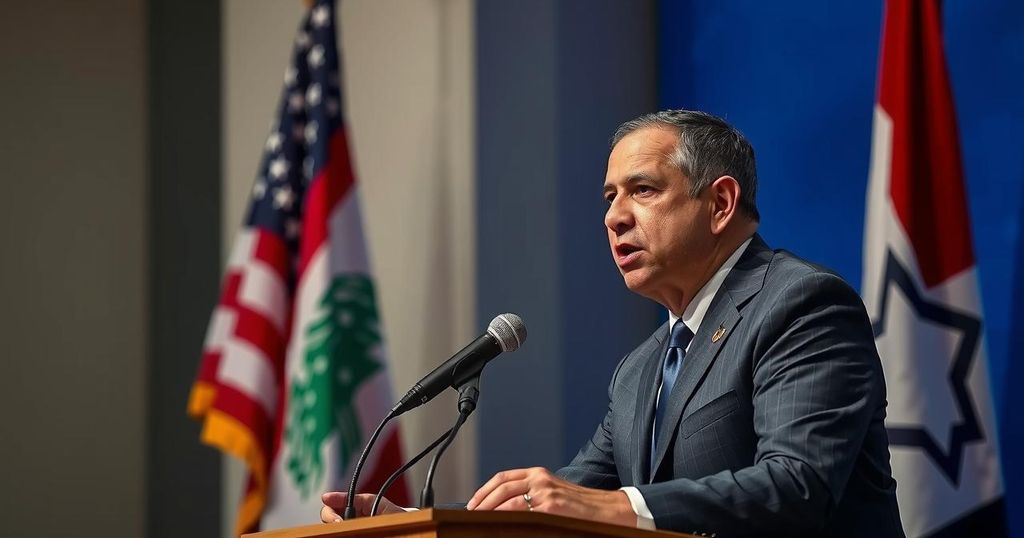U.S. Ambassador Lisa Johnson Advocates for Uprising Against Hezbollah in Lebanon

U.S. Ambassador to Lebanon, Lisa Johnson, advocates for an internal uprising against Hezbollah in collaboration with local political factions amidst ongoing Israeli conflicts. She encourages Lebanese leadership to support General Joseph Aoun for presidency and aims to exploit regional conditions to diminish Hezbollah’s power both militarily and politically.
Recent revelations reported by Al-Akhbar newspaper indicate that U.S. Ambassador to Lebanon, Lisa Johnson, is actively pursuing an agenda aimed at facilitating a ‘post-Hezbollah era’ by galvanizing internal forces against the militant group during its ongoing conflict with Israel. According to a senior Lebanese security source, Johnson has engaged in discussions with Lebanese politicians, advocating for an uprising to confront Hezbollah, urging them that, “Israel cannot achieve everything through war; it’s time for you to do your part and launch an internal uprising under the banner of ‘Enough.’” She emphasized the urgency for the Lebanese populace to express their intent to remove Hezbollah from power, envisioning a return to the political dynamics that existed following the assassination of former Prime Minister Rafik Hariri. Ambassador Johnson encouraged her allies to support the candidacy of General Joseph Aoun, Commander of the Lebanese Armed Forces, for the presidency, stating, “He [Aoun] will appoint a strong commander for the Lebanese Army, and we will support the Army in restraining all Hezbollah supporters.” Johnson’s assertion highlights the potential backing from both Arab nations and Western powers, coupled with a clear call to action for the Lebanese leadership amid the changing regional landscape. The ambassador’s approach reportedly includes fostering internal sectarian tensions, particularly in areas populated by displaced individuals primarily from Hezbollah’s strongholds. The complexities of Lebanon’s multi-confessional society, scarred from a brutal civil war from 1975 to 1990 which resulted in approximately 150,000 fatalities, render it particularly vulnerable to external manipulation. The source also disclosed that Johnson aims to weaken Hezbollah’s position by instigating discord within the Shia community, expressing a desire for a comprehensive campaign that does not merely aim to diminish Hezbollah’s military clout but seeks to dismantle its political structure, stating, “We do not only want to limit Hezbollah’s influence, but we will strike its support lines, and we are working non-stop to bring down the regime in Iran as well.”
The current geopolitical landscape surrounding Lebanon is characterized by a complicated interplay of sectarian divisions and external influences. U.S. involvement, particularly through Ambassador Lisa Johnson, has manifested in a strategy aimed at undermining Hezbollah, a prominent Shia political and military entity in Lebanon, amidst its confrontations with Israeli forces. Historically, Lebanon’s multi-denominational social fabric was severely tested during a prolonged civil war that left deep scars and bred mistrust among communities. The re-emergence of sectarian tensions in the context of recent escalations between Israel and Hezbollah raises concerns about the potential for renewed conflict fueled by external political agendas, particularly those of Western nations seeking to reshape Lebanon’s political landscape post-Hezbollah.
In summary, the actions and statements of U.S. Ambassador to Lebanon, Lisa Johnson, reflect a strategic initiative to invoke internal dissent against Hezbollah amid its conflict with Israel. Through mobilization efforts and support for specific political candidates, Johnson underscores the urgency for Lebanon to confront Hezbollah, all while navigating the heightened sectarian sensitivities inherent in the diverse Lebanese society. The implications of this approach are potential destabilization and further complicating Lebanon’s already delicate political landscape, relying heavily on external support.
Original Source: mronline.org








